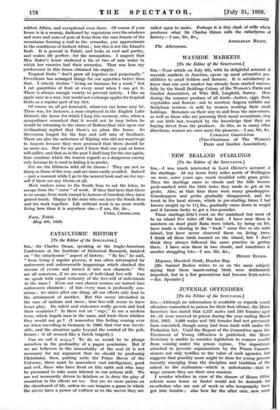CATACLYSMIC HISTORY [To the Editor of the SPECTATOR.]
Sin,—Sir Charles Oman, speaking at the Anglo-American Conference at the Institute of Historical Research, insisted on " the cataclysmic " aspect of history. " So far," he said, " from being a regular process, it was often interrupted by unforeseen and unforeseeable happenings which checked the stream of events and turned it into new channels." We are all conscious, if we are sane, of individual free-will. Can we speak with equal certainty of the free-will of individuals in the mass ? Even our own chosen courses are turned into unforeseen channels ; of this every man is profoundly con-. scions ; we strive after one thing, all our efforts only lead to the attainment of another. But this seems intensified in the case of nations and races ; here free-will seems to have lesser play. Do rulers and statesmen really govern and lead their countries ? Is there not an " urge," to use a modem term, which impels men in the mass, and leads them whither they would not go ? (I remember this feeling coming over me when travelling in Germany in 1909, that war was inevit- able, and the situation quite beyond the control of the poli.. ticians ; it all seemed like a Greek tragedy.)
Can we call it dvivrg ? To do so would be to plunge ourselves in the profundity of a pagan pessimism. But if we are believers in the immortality of the soul (it is not necessary for my argument that we should be professing Christians), then, putting aside the Prime Mover of the Universe, there must be somewhere vast intelligences, good and evil, those who have lived on this earth and who may be presumed to take some interest in our actions still. We are not necessarily driven to fatalism or to deny the play of causation in the effects we see. Nor are we mere pawns on the chessboard of life, unless we can imagine a game in which the pieces have a power of volition as to the moves they are
called upon to make. Perhaps it is this clash of wills which produces what Sir Charles Oman calls the cataclysms of
history.—I' am, Sir, &c., ATHELSTAN RILEY.
The Athenaeum.


































 Previous page
Previous page